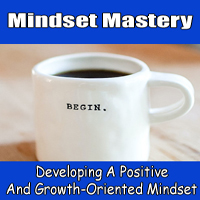



Mental strength is a formidable trait that enables individuals to endure life's challenges, persevere through adversity, and reach their full potential. It is the inner fortitude and resilience that empowers people to overcome obstacles, maintain a positive mindset, and ultimately lead fulfilling lives. In a world where trials and tribulations are inevitable, mental strength stands as a steadfast pillar of support.
Embracing Adversity: One of the core aspects of mental strength is the ability to embrace adversity. Instead of shying away from challenges, mentally strong individuals confront them head-on. They view hardships as opportunities for growth and learning. This perspective helps them navigate difficult situations with courage and resilience.
Positive Mindset: Mental strength is closely connected to maintaining a positive mindset, even when faced with setbacks. It's about focusing on solutions rather than dwelling on problems. This positive attitude not only alleviates stress but also attracts constructive outcomes.
Resilience: Resilience is the hallmark of mental strength. When life throws curveballs, mentally strong individuals bounce back with determination. They understand that setbacks are part of the journey and do not let failures define them. Resilience keeps them moving forward.
Self-Confidence: Mental strength nurtures self-confidence. Believing in one's abilities and potential is pivotal to overcoming challenges. Self-assured individuals are more likely to tackle new opportunities, make decisions, and push their boundaries.
Stress Management: Mental strength equips individuals with the tools to manage stress effectively. Instead of succumbing to pressure, they develop coping mechanisms that help them stay calm and composed under trying circumstances.
Adaptability: Mental strength enables adaptability. It allows individuals to adjust to changing situations, whether in personal or professional life. They are open to new ideas and possess the flexibility to adapt to unexpected turns of events.
Optimism: Maintaining optimism is a significant component of mental strength. It's about looking at the glass as half full rather than half empty. An optimistic outlook not only boosts self-esteem but also encourages others to adopt a positive attitude.
Focus And Determination: Mentally strong individuals are often highly focused and determined. They set clear goals and work tirelessly to achieve them. Distractions and self-doubt are minimal when mental strength is at its peak.
To cultivate and enhance mental strength, one can engage in various practices such as mindfulness, meditation, regular exercise, and setting achievable goals. Seeking support from mentors, therapists, or coaches can also aid in building and maintaining mental fortitude.
Mental strength is not an abstract concept but a tangible quality that can be developed and strengthened over time. It is the bedrock upon which personal and professional success is built. The ability to endure adversity, maintain a positive outlook, and bounce back from failures are all manifestations of mental strength. It is the inner resilience that enables individuals to thrive despite life's challenges, and it is a quality well worth nurturing throughout one's journey. With mental strength as a foundation, one can rise above difficulties and lead a life filled with purpose and fulfillment.
The Path To Personal And Professional Success
 Defining Achievement
Defining Achievement
Achievement is a broad and subjective concept, often varying from person to person. It can encompass a wide range of goals, such as academic accomplishments, career milestones, personal development, physical fitness, creative endeavors, and more. What's essential is that achievement represents a sense of progress and accomplishment in a particular area of life.
Motivation And Ambition
Striving for achievement is closely tied to motivation and ambition. It's the driving force that compels individuals to set goals and pursue them with passion and dedication. Ambition is the spark that ignites the desire for personal growth and success, pushing people to strive for more.
Setting Goals And Overcoming Challenges
The path to achievement begins with setting clear and meaningful goals. These objectives serve as beacons that guide individuals toward what they wish to accomplish. Whether it's earning a degree, climbing the corporate ladder, writing a novel, or achieving a fitness milestone, goals provide direction and purpose.
Challenges and obstacles are an integral part of any journey toward achievement. They test an individual's determination and resilience. While facing challenges may seem daunting, it's through overcoming them that true growth and achievement are realized. These trials teach valuable lessons and build character, ultimately contributing to a sense of accomplishment.
Navigating The Journey Of Self-Discovery
 Define Your Goals: Clearly define your goals. These goals act as destinations on your roadmap. Whether they're related to your career, personal development, relationships, or any other aspect of life, having well-defined objectives will provide you with a sense of purpose and direction.
Define Your Goals: Clearly define your goals. These goals act as destinations on your roadmap. Whether they're related to your career, personal development, relationships, or any other aspect of life, having well-defined objectives will provide you with a sense of purpose and direction.
Set A Plan: A roadmap is only effective when it comes with a plan. Break down your goals into actionable steps. Consider what skills, knowledge, or resources you need to acquire. Creating a strategic plan will ensure you stay on track.
Lifelong Learning: To reach your potential, you must embrace lifelong learning. Seek knowledge, acquire new skills, and stay curious. Engage in reading, attend workshops, take courses, and surround yourself with individuals who inspire you to grow.
Resilience: Challenges are inevitable on your journey to potential. Resilience is your ability to bounce back from setbacks. Accept that you might encounter obstacles and setbacks, but also recognize that they are opportunities to learn and grow.
Overcoming Emotional Challenges And Their Lingering Shadows
 Understanding Emotional Challenges And Shadows
Understanding Emotional Challenges And Shadows
Emotional challenges encompass a wide range of experiences, including grief, anxiety, depression, trauma, and more. These challenges create emotional wounds that, if left unaddressed, can manifest as "shadows" - persistent negative emotions, thought patterns, or behaviors that linger and continue to affect our lives.
Acknowledge The Challenges
The first step in overcoming emotional challenges is acknowledging their existence. It can be difficult to confront your feelings, but denial or suppression only prolongs the healing process. Accept that you are facing emotional challenges and that it's okay to seek help and support.
Seek Professional Assistance
One of the most valuable steps in overcoming emotional challenges is seeking professional help. Therapists, counselors, and mental health experts can provide the guidance, strategies, and tools to navigate complex emotional issues. Their expertise can be pivotal in addressing the shadows these challenges cast.
Accept And Express Your Emotions
Emotional challenges often bring forth a flood of emotions, and it's essential to accept and express them. Whether through talking with a trusted friend, keeping a journal, or engaging in artistic expression, letting your emotions out can be cathartic and help you understand the depth of your feelings.
Develop Coping Strategies
As you confront emotional challenges, it's essential to develop healthy coping strategies. These strategies can include mindfulness, meditation, exercise, and stress-reduction techniques. Finding what works best for you can help you manage the emotional turmoil that often accompanies these challenges.






Finding Balance Amidst Chaos
 One valuable technique for prioritization is the Eisenhower Matrix, which categorizes tasks into four quadrants based on their urgency and importance. This method helps you distinguish between tasks that demand immediate attention and those that can be deferred, allowing you to focus on what truly matters.
One valuable technique for prioritization is the Eisenhower Matrix, which categorizes tasks into four quadrants based on their urgency and importance. This method helps you distinguish between tasks that demand immediate attention and those that can be deferred, allowing you to focus on what truly matters.
Time Management And Organization
Time management and organizational skills are your greatest allies in the juggling act. Create a structured schedule that allocates dedicated time for various responsibilities. Utilize tools like calendars, to-do lists, and time management apps to stay organized and on top of your tasks.
Setting realistic goals and deadlines can help you manage your responsibilities more efficiently. Avoid overloading your schedule and strive for a balance that accommodates your individual capacity and energy levels.
Effective Communication And Delegation
Juggling life responsibilities also involves effective communication and delegation. In both personal and professional spheres, clear communication with family members, colleagues, and supervisors is essential. Let them know your commitments and limitations, and don't hesitate to ask for support or adjustments when needed.
Delegation is a powerful tool for managing life responsibilities. Learn to trust others with certain tasks, whether at home or work. Delegating not only lightens your load but also provides opportunities for others to contribute and grow.
 Optimism And Resilience: A positive mindset allows you to approach relationships with optimism and resilience. Instead of dwelling on past conflicts or failures, you focus on the potential for growth and understanding. This resilience helps you bounce back from disagreements and setbacks, making your relationships more robust.
Optimism And Resilience: A positive mindset allows you to approach relationships with optimism and resilience. Instead of dwelling on past conflicts or failures, you focus on the potential for growth and understanding. This resilience helps you bounce back from disagreements and setbacks, making your relationships more robust.
Effective Communication: Positive-minded individuals tend to be better communicators. They are more inclined to listen actively, express themselves clearly, and avoid misunderstandings. Effective communication is crucial for building and maintaining healthy relationships.
Conflict Resolution: Conflict is a natural part of any relationship, but a positive mindset can help resolve conflicts in a more constructive way. Instead of resorting to blame or defensiveness, you are more likely to seek compromise and mutually beneficial solutions.
Empathy And Compassion: A positive mindset encourages empathy and compassion. You are more capable of putting yourself in another person's shoes, understanding their perspective, and responding with kindness and compassion. This fosters trust and deepens your connections.
Healthy Boundaries: Cultivating a positive mindset also involves setting and respecting healthy boundaries. By doing so, you ensure that your needs are met and that you maintain a sense of balance in your relationships. Healthy boundaries are essential for long-term relationship satisfaction.